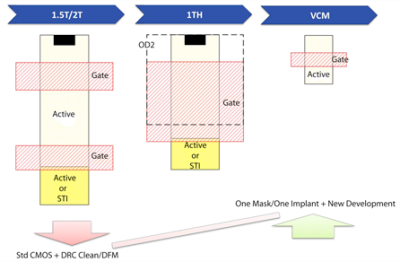Feb 20 2013
Kilopass Technology Inc., a leading provider of semiconductor logic non-volatile memory (NVM) intellectual property (IP), announced today that Frost & Sullivan, a leading provider of growth strategy consulting and market research, awarded Kilopass the Kilopass Frost & Sullivan NVM Innovator Award. The award recognizes Kilopass Virtual Crosspoint Memory (VCM) for increasing the bit density of NVM in a standard logic CMOS process by four fold. At less than half the cost of embedded or external flash with die area similar to SRAM and the flexibility of field programmability, a number of applications will benefit from VCM, from microcontrollers to touch display drivers.
 Figure 1
Figure 1
“We are delighted to receive this prestigious award by Frost & Sullivan,” said Charlie Cheng, president and CEO of Kilopass Technology Inc. “The award recognizes Kilopass’s pursuit to continue to innovate in the logic NVM space. We manufactured the first logic antifuse technology in 2002 that is now in high-volume production in end products, from gaming consoles to automobiles. With VCM, we are able to expand our addressable market into embedded systems, including microcontrollers, by increasing the capacity and performance, while achieving a 4X decrease in footprint.”
For the 2012 Global Technology Innovation Award in Non-volatile Memory, Frost & Sullivan evaluated three companies offering NVM memory using five criteria: (1) uniqueness of technology, (2) impact on new products/applications, (3) impact on functionality, (4) impact on customer value, and (5) relevance of innovation to industry. Out of a possible 10 in each category, Kilopass scored 8 in the first two and last categories, and 9 in the remaining two, for a rated average of 8.8. The weighted averages for the other two companies considered for the award were 7.8 and 6.6. Kilopass was the clear choice.
“Through the VCM bit cell technology, Kilopass is offering customers the ability to enjoy high-density NVM, thus delivering increased value,” said Robin Varghese, research analyst for Frost & Sullivan’s Semiconductors Group under the Measurements and Instrumentation business unit. “Its ability to cater to a wide variety of devices that are manufactured in the range between 180 nm to 20 nm makes the technology ideal for a plethora of products and new applications that require compact form, high battery life, and memory capacity.”
About Virtual Crosspoint Memory
The redesigned VCM bit cell reduces the area needed to store a bit of data by a factor of four over the comparable footprint of an embedded flash bit cell (see Figure 1).
The small size of the VCM bit cell is enabled by a new transistor construction in silicon. Building a conventional transistor requires a P+ gate atop an N-well, which is deeper than the shallow trench isolation (STI) that isolates adjacent transistors (see Figure 2). Building an anti-fuse transistor using this conventional technique requires a large bit cell to accommodate the deep N-well beneath the gate and its associated spacing rules. The new VCM bit cell incorporates an N-well that is shallower than the STI and uses the P substrate to provide the insulation between adjacent bit-cell transistors. (For more on the VCM technology, click here. For a video of Kilopass CTO Harry Luan describing the VCM technology, click here.)
About the Technology Innovation Award
Frost & Sullivan’s Technology Innovation Award is part of its Best Practice Awards, which recognize companies in a variety of regional and global markets for demonstrating outstanding achievement and superior performance in areas such as leadership, technological innovation, customer service, and strategic product development. Awards are based entirely on the merit of the product, service, or technology being evaluated. The first phase of the research process focuses on key industry challenges. Once these are determined, it is then possible to identify applicable measurements that address those challenges. The next phase, market research, is based on in-depth interviews with vendors, suppliers, and customers. When a company’s product, service, or technology exceeds the preset criteria, the analyst team identifies potential Award nominees through a rigorous methodology. Awards are applicable to all companies, regardless of size, public or private status, or if they do business with Frost & Sullivan. Frost & Sullivan follows this model to keep the process 100 percent unbiased.